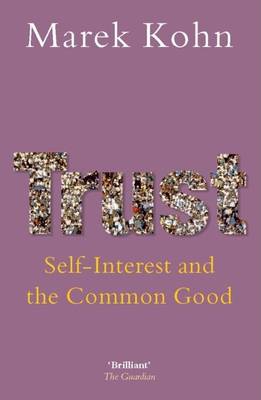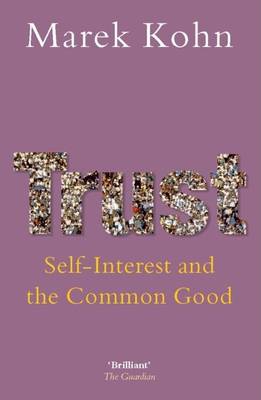
- Afhalen na 1 uur in een winkel met voorraad
- Gratis thuislevering in België vanaf € 30
- Ruim aanbod met 7 miljoen producten
- Afhalen na 1 uur in een winkel met voorraad
- Gratis thuislevering in België vanaf € 30
- Ruim aanbod met 7 miljoen producten
Zoeken
Omschrijving
Trust--whether between parents and children, merchants and shoppers, banks and investors, or citizens and their government--lies at the very heart of our relationships, our society, and our everyday lives.
This vividly written compact book reveals how modern thinkers--scientists, social scientists, and philosophers--have shed much light on the nature of trust. Beginning with some fascinating evolutionary puzzles about the origins of trust--for instance, how cooperation can evolve among individuals pursuing their own selfish interests--Marek Kohn incorporates many different perspectives from the fields of science, sociology, economics, and politics, to draw out the wider implications of trust in human society today. The book discusses trust in gods and how people have sought to reinvest this trust as religious faith has diminished; the effect of low social trust on economic development; and the loss of trust between mutually antagonistic communities, each warming itself by the flames of its hostility to the other. He shows how Communism relied on distrust, and devoted much of its energy to seeding it among its subjects, and Liberal democracy is also based on distrust, but in the opposite direction: it is founded upon the suspicion that the powerful will be tempted to abuse their power, and so must be subject to checks and balances. Perhaps most important, he shows that if we understand what makes trust possible, and why it matters, then we will live better lives in a fast-moving, fast-changing, global society.
This vividly written compact book reveals how modern thinkers--scientists, social scientists, and philosophers--have shed much light on the nature of trust. Beginning with some fascinating evolutionary puzzles about the origins of trust--for instance, how cooperation can evolve among individuals pursuing their own selfish interests--Marek Kohn incorporates many different perspectives from the fields of science, sociology, economics, and politics, to draw out the wider implications of trust in human society today. The book discusses trust in gods and how people have sought to reinvest this trust as religious faith has diminished; the effect of low social trust on economic development; and the loss of trust between mutually antagonistic communities, each warming itself by the flames of its hostility to the other. He shows how Communism relied on distrust, and devoted much of its energy to seeding it among its subjects, and Liberal democracy is also based on distrust, but in the opposite direction: it is founded upon the suspicion that the powerful will be tempted to abuse their power, and so must be subject to checks and balances. Perhaps most important, he shows that if we understand what makes trust possible, and why it matters, then we will live better lives in a fast-moving, fast-changing, global society.
Specificaties
Betrokkenen
- Auteur(s):
- Uitgeverij:
Inhoud
- Aantal bladzijden:
- 160
- Taal:
- Engels
Eigenschappen
- Productcode (EAN):
- 9780199217922
- Verschijningsdatum:
- 9/11/2009
- Uitvoering:
- Paperback
- Formaat:
- Trade paperback (VS)
- Afmetingen:
- 127 mm x 193 mm
- Gewicht:
- 113 g

Alleen bij Standaard Boekhandel
+ 64 punten op je klantenkaart van Standaard Boekhandel
Beoordelingen
We publiceren alleen reviews die voldoen aan de voorwaarden voor reviews. Bekijk onze voorwaarden voor reviews.








